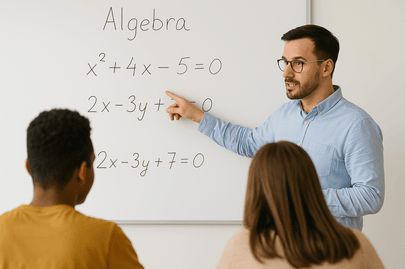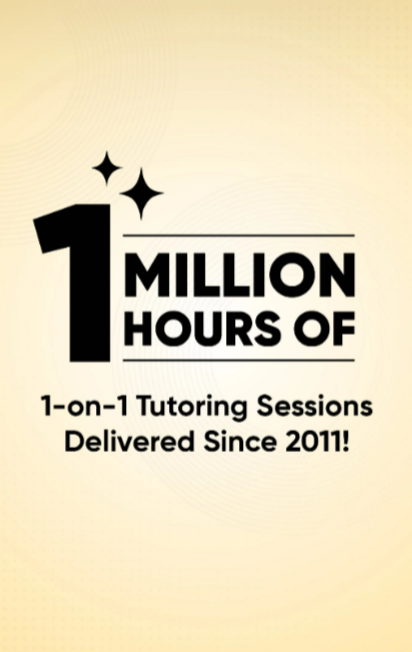What is the best way to teach Algebra?
Algebra is one of the most important branches of mathematics, providing the foundation for higher-level math and real-world applications. However, many students find algebra challenging because of its abstract nature. The role of an algebra tutor is crucial in helping students grasp key concepts effectively. In this blog, we will explore the best methods for teaching algebra, including modern teaching strategies, technology, and personalized approaches to cater to different learning styles.
Understanding the challenges of learning Algebra
Before diving into teaching methods, it is important to understand why students struggle with algebra. Some common challenges include:

- Difficulty understanding abstract symbols and variables
- Weak foundational math skills, such as arithmetic operations
- Lack of real-world applications and connections
- Fear of making mistakes, leading to a lack of confidence
An effective algebra tutor recognizes these challenges and tailors their teaching approach to address them.
Best methods of teaching Algebra
- Operations with fractions and decimals
- Integer properties and number sense
- Basic equation-solving techniques
1. Start with a strong foundation
Many students struggle with algebra because they lack proficiency in basic math skills. Pre-algebra tutors play a crucial role in bridging this gap by reinforcing fundamental concepts such as:
- Finance, such as calculating interest rates, budgeting, and investments
- Science, such as understanding formulas in physics and chemistry
- Engineering and technology, including programming, construction, and architecture
2. Use real-life applications
One of the best ways to engage students in Algebra is by demonstrating its real-world relevance. A skilled Algebra tutor can incorporate examples from:
This approach ensures that the students develop a deeper appreciation for the subject.
- Introduce concepts gradually, starting with simple equations and progressing to more complex ones
- Use clear explanations and avoid unnecessary jargon
- Provide plenty of practice problems with increasing difficulty levels
3. Adopt a step-by-step approach
Breaking down algebra into smaller, digestible steps is essential for effective learning. Algebra tutors should:
This approach ensures that the students develop a deeper appreciation for the subject.
- Asking students to explain their thought process while solving problems
- Encouraging group discussions and peer teaching
- Using interactive whiteboards or virtual simulations
4. Encourage active learning and problem-solving
Instead of merely lecturing, the best algebra tutors engage students in active learning. Some effective techniques include:
This step makes learning Algebra more interactive, students retain concepts better and develop critical thinking skills.
- Graphing calculators like Desmos and GeoGebra to help visualize equations and functions
- Online algebra tutors from platforms like Khan Academy, Chegg, and private tutoring services for additional support
- Gamification apps like DragonBox that make algebra fun and engaging through games and challenges
5. Leverage technology and online tools
With the rise of digital learning, many tools can enhance the teaching of algebra. Some useful resources include:
- One-on-one tutoring sessions to focus on specific problem areas
- Adaptive learning platforms that adjust difficulty levels based on student performance
- Additional worksheets and practice tests for reinforcement
6. Personalize learning based on student needs
Every student learns at a different pace. A good algebra tutor identifies a student's strengths and weaknesses and customizes the learning experience. Personalized strategies may include:
- Graphing equations on a coordinate plane to demonstrate relationships between variables
- Using manipulatives, such as algebra tiles, to represent equations physically
- Flowcharts and diagrams to simplify complex algebra 2 concepts
7. Use visual aids and hands-on activities
Visual learning aids are powerful tools for teaching algebra. Tutors can incorporate:
For hands-on learners, activities such as building geometric shapes or solving puzzles can be beneficial.
- Encouraging students to view mistakes as learning opportunities
- Providing positive reinforcement and celebrating small victories
- Flowcharts Teaching problem-solving strategies rather than rote memorization
8. Develop a growth mindset and confidence
Many students develop anxiety around algebra due to past struggles. The best algebra tutors foster a growth mindset by:
A confident student is more likely to embrace challenges and persist through difficult problems.
- Quizzes and tests to track progress over time
- Oral explanations where students verbalize how they solve problems
- Self-reflection exercises where students analyze their mistakes and learn from them Timely and constructive feedback helps students stay on track and improve their skills effectively.
9. Provide regular assessments and feedback
Assessing a student’s understanding regularly helps identify areas for improvement. Effective assessment strategies include:
- Quadratic equations
- Polynomials and factoring
- Exponential and logarithmic functions
10. Prepare students for advanced Algebra (Algebra 2 and beyond)
As the students progress, they will encounter more complex topics in Algebra 2, such as:
A good tutor ensures that students transitioning from algebra 1 to algebra 2 have the necessary problem-solving skills to tackle advanced topics confidently.
Final thoughts on teaching Algebra effectively
Teaching algebra effectively requires a combination of strong foundational instruction, engaging teaching methods, real-world applications, and personalized learning strategies. Whether through traditional classroom teaching or one-on-one sessions with an algebra tutor, ensuring students grasp algebra concepts early on sets them up for success in mathematics and beyond.
For students struggling with Algebra, seeking help from the right algebra tutors—whether online or in-person—can provide the necessary support to master the subject. With the right guidance and teaching approach, any student can develop confidence and proficiency in algebra, making it a stepping stone to future academic and career success.

 United States
United States United Kingdom
United Kingdom Australia
Australia Canada
Canada Middle East
Middle East Europe
Europe